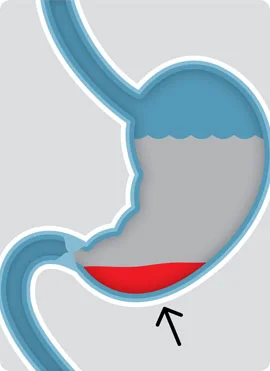Gastroparesis
 What is Gastroparesis?
What is Gastroparesis?
Gastroparesis is a condition that affects the normal movement of the muscles in your stomach. With gastroparesis, your stomach’s motility is slowed down or doesn’t work, preventing your stomach from emptying properly, instead of proprelling food through the digestive tract.
The cause of gastroparesis is usually unknown, it can be a complication of diabetes or it can be developed after surgery. Some medications such as opioid pain relievers, some antidepressants, and high blood pressure and allergy medications, can lead to slow gastric emptying and cause similar symptoms. Patients that already have gastroparesis, these medications may make their condition worse.
Symptoms
Signs and symptoms of gastroparesis include:
- Abdominal pain
- Vomiting/nausea
- Abdominal bloating
- A feeling of fullness after eating a small amount
- Vomiting undigested food
- Acid reflux
- Changes in blood sugar levels
- Lack of appetite
- Weight loss and malnutrition
Many people with gastroparesis don’t have any noticeable signs and symptoms.
Causes
It’s not always clear what leads to gastroparesis, but in some cases it can be caused by damage to a nerve that controls the stomach muscles (vagus nerve).
The vagus nerve helps manage the complex processes in your digestive tract, including signaling the muscles in your stomach to contract and push food into the small intestine. A damaged vagus nerve can’t send signals normally to your stomach muscles. This may cause food to remain in your stomach longer, rather than move into your small intestine to be digested.
The vagus nerve and its branches can be damaged by diseases, such as diabetes, or by surgery to the stomach or small intestine.
Risk factors
Factors that can increase your risk of gastroparesis:
- Diabetes
- Abdominal or esophageal surgery
- Infection, usually from a virus
- Certain medications that slow the rate of stomach emptying, such as narcotic pain medications
- Scleroderma — a connective tissue disease
- Nervous system diseases, such as Parkinson’s disease or multiple sclerosis
- Underactive thyroid (hypothyroidism)
Women are more likely to develop gastroparesis than are men.
Complications
Gastroparesis can cause several complications, such as:
- Severe dehydration and vomiting can cause dehydration.
- Malnutrition. Poor appetite can mean you don’t take in enough calories, or you may be unable to absorb enough nutrients due to vomiting.
- Undigested food that hardens and remains in your stomach. Undigested food in your stomach can harden into a solid mass called a bezoar. Bezoars can cause nausea and vomiting and may be life-threatening if they prevent food from passing into your small intestine.
- Unpredictable blood sugar changes. Although gastroparesis doesn’t cause diabetes, frequent changes in the rate and amount of food passing into the small bowel can cause erratic changes in blood sugar levels.
- Decreased quality of life
